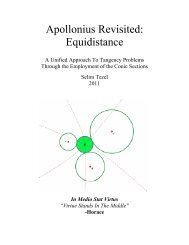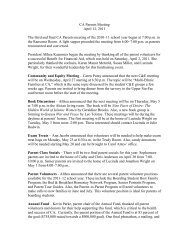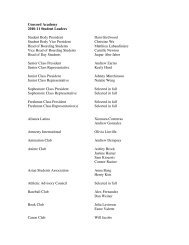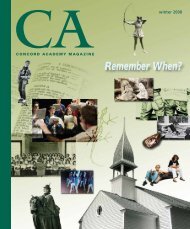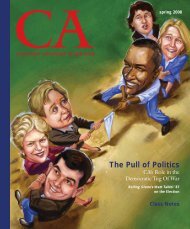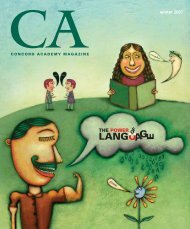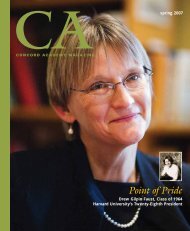CAMPUS
Meet Rick Hardy - Concord Academy
Meet Rick Hardy - Concord Academy
You also want an ePaper? Increase the reach of your titles
YUMPU automatically turns print PDFs into web optimized ePapers that Google loves.
Right: Parkman Howe teaching a class on theBible. Below, from top: Yoga teacher Janet CorryFarnsworth ‘84 leading a class; Marc Fidelman‘04, Liz Mygatt ‘01, Brian Gray ‘01, Nick Deane‘01, Kelsey Stratton ‘01, and Vi Davis ‘99; CareyMack Weber ‘79 and Julia Glass ‘74; CA teacherBen Eberle ‘99 teaching ceramics to MadeleineAnderson, daughter of Helen Nelson Anderson‘84; “CA Alumnae/i Weigh In on the Marketsand the Economy,” led by Peter Fisher ‘74, JorgeSolares-Parkhurst ‘94, and Tracy Welch ‘89.tions to the three, asking why interest rates wereso low, how much blame the Fed deserves, andwhether federal TARP (Troubled Asset ReliefProgram) funding was repaid too soon. Welchexplained that one reason banks are eager torepay the money is that it’s tied to restrictions oncompensation, which can turn loyal employeesinto free agents. “The smart people who canmake a lot of money—they’re going to go wherethey’re compensated,” she said, adding thatCredit Suisse was able to attract top performersfrom other banks because it did not take TARPdollars. When discussion turned to companies“too big to fail,” Welch suggested the concept bebetter expressed as “too interconnected to fail.”She decried the inconsistency of governmentsolutions. “Why was Bear shoved into a shotgunmarriage and Lehman allowed to fail?” she asked.The panel discussing “The Evolving Futureof Journalism” sparked some friendly friction, asspectators dug in on the value of preserving printmedia or of letting newspapers go. “They’re alldead,” one feisty audience member asserted. “It’slike talking about a mainframe computer.”The panel included Julia Preston ’69 of theNew York Times; novelist and former journalistIsabel Fonseca ’79; ESPN producer Amy Rosenfeld’84; Nancy Schoeffler ’69, a HartfordCourant editor; and freelance journalist NancyShohet West ’84. Lea Morse Sloan ’69, PBS vicepresident of communications, moderated. Sloanbegan by asking the audience how many subscribeto print newspapers, and nearly all handsin the (clearly aberrant) group shot up. She citeda study demonstrating a decline in civic involvementafter a newspaper folded, and pointed outthat newspapers were not originally establishedas businesses, but as ways to gain social and civicinfluence.As panelists discussed the demise of oncethrivingpapers, Preston, a Pulitzer Prize–winnerwho has been in daily news for thirty-one years,cut to the chase. “The issue is not whether newspaperswill disappear,” she said, “but whether thereporting will disappear.” The Times Web site stillrelies for content primarily on reporters paid bythe newspaper, she said. While the Times hasavoided the layoffs suffered by most papers thisyear, Schoeffler described draconian cuts at theCourant, where she now edits content formerlyhandled by two or more editors.No one disputed that the industry is in transition,and a working business model elusive.“Fundamental decisions have yet to be madeC O N C O R D A C A D E M Y M A G A Z I N E F A L L 2 0 0 938



